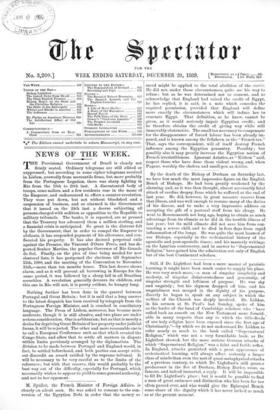Still, if Dr. Lightfoot had been a mere master of
patristic learning, it might have been much easier to supply his place.
He was very much more,—a man of singular simplicity and modesty, of singular disinterestedness and generosity, of singular strength and loftiness of purpose. He was shy and ungainly ; but his shyness dropped off him, and his ungainliness was merged in the dignity of his purpose, directly he began to speak on any subject in which the welfare of the Church was deeply involved. Dr. Liddon, in his sermon at St. Paul's last Sunday, spoke of him as the leader of the band of Cambridge scholars who " have rolled back an assault on the New Testament more formid- able in many respects than any to which the title-deeds of our holy religion have been exposed since the first age of Christianity,"—by which we do not understand Dr. Liddon to refer nearly so much to the book called " Supernatural Religion," which was not a very formidable book, as Dr. Lightfoot showed, but the more serious German attacks of which "Supernatural Religion," was a faint and feeble reflex. In England, attacks garnished with a great appearance of ecclesiastical learning, will always affect seriously a larger class of minds than even the sort of quasi-metaphysical attacks of a previous century, to which Dr. Lightfoot's still greater predecessor in the See of Durham, Bishop Butler, wrote so famous, and indeed immortal, a reply. It will be impossible to fill Dr. Lightfoot's place ; but it would be possible to find a man of great eminence and distinction who has been far too often passed over, and who would give the Episcopal Bench some share of the dignity which it has never lacked so much as at the present moment.


































